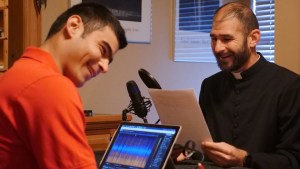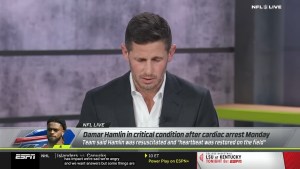Lenten Campaign 2025
This content is free of charge, as are all our articles.
Support us with a donation that is tax-deductible and enable us to continue to reach millions of readers.
Charles Osgood will be remembered for many things: his radio voice, his knack for story-telling, his warm personality on and off the air, his rhymes.
But one of the most shared-online poems that Osgood produced was about a human value that sometimes seems very lacking in today’s world: responsibility.
Six sing-songey verses, playing on the words “Everybody,” “Anybody,” “Somebody,” and “Nobody,” drove home the lesson: If I don’t take responsibility, no one will.
One verse says:
Anybody could have told you that everybody knew
That this was something somebody surely had to do.
Nobody was unwilling; anybody had the ability.
But nobody believed that it was their responsibility.
The longtime host of “CBS Sunday Morning” died at his home in Saddle River, New Jersey, January 23. He was 91 and suffered from dementia.
Mischief in Catholic school
Born Charles Osgood Wood III in New York on January 8, 1933, he moved with his family to Baltimore and attended a Catholic grammar school there. In a memoir published in 2004, Defending Baltimore Against Enemy Attack, he recalled receiving an early lesson there about responsibility and honesty. He was just nine, and yet he already displayed several talents that led his Sisters of Charity teachers to call him “The Professor.” One teacher, Sister Serena, encouraged him to play the organ at Sunday Mass, but he just wasn’t up for the Bach fugue she wanted him to perform.
Young Charles’ solution was to unplug the organ when no one was looking, leading his teacher to conclude that it was broken and, hopefully, let Charlie off the hook.
Sister Serena, however, called his bluff, and he admitted the deed. After a week of mandatory after-school attendance, Sister Serena allowed the boy to play another, less challenging piece the following Sunday instead.
In a 2004 interview with the Catholic Review, newspaper of the Archdiocese of Baltimore, Osgood said his childhood world revolved around Our Lady of Lourdes parish and school.
“The nuns’ high expectations had everything to do with his success as a popular radio broadcaster, writer and television host,” the Review said.
“I do think these were extremely dedicated teachers,” Osgood told the Review’s managing editor George P. Matysek Jr. “You can’t expect them to do that unless they are motivated by something other than a paycheck. They had a level of dedication you can’t expect in the civilian world.”
Love of radio
The family moved back to New York, and Charles attended St. Cecilia High School in Englewood, New Jersey. He majored in economics at Fordham University in the Bronx, where the Jesuits required students to take certain courses that some might consider impractical, as Osgood told Fordham Magazine in 1980.
“In those days at Fordham we also studied such arcane subjects as epistemology, cosmology, and ontology,” he said. “It didn’t seem possible that I’d even make a living from them, but I swear I am! That’s because they developed in me the process of orderly thinking — the methodology of going from one step to another.”
But it was his volunteer service at Fordham’s relatively new campus radio station, WFUV, that led to his lifelong career. In its obituary this week, Fordham said that Osgood eventually hosted his own show, “No Soap Opera,” and worked alongside other future celebrities, including actor Alan Alda, a 1956 graduate of Fordham.
Osgood spent more time in the studio than in class. “When I wasn’t on duty there I would just stay around because I enjoyed it so much,” he said.
After graduating in 1954, Osgood was hired as an announcer by classical music stations in Washington, D.C. A chance encounter led to a new direction in his life.
“I ran into a guy while I was having dinner with a friend of mine and he was dressed in a white uniform,” he recalled in a 1991 interview with the Los Angeles Times. “It turned out he was the announcer for the United States Army Band. I asked him when he was getting out and he said within the next few weeks, so the next morning I was parked out at the commanding officer’s office. He was impressed with the fact I could pronounce Rimsky-Korsakov.”
The move allowed him more of a choice than if he had been drafted. It also led to his first close encounter with the Commander-in-Chief.
In September 1955, President Dwight D. Eisenhower suffered a serious heart attack and was confined to a hospital room until November. During this time, under the auspices of WGMS, Osgood hosted a closed-circuit program of classical music delivered exclusively to the president’s room to encourage relaxation and convalescence.
The Osgood File
Following his stint in the Army, Osgood worked as a radio announcer for a few years until landing his first job in television in 1962, as general manager of a station in Hartford, Connecticut. Then, a former Fordham classmate who was working at the ABC Radio Network hired him as a writer and host of a show that related human interest stories. While there, he began using his middle name, Osgood, as his surname, because the network already had an announcer named “Charles Woods.”
In 1967 he moved to CBS Radio, anchoring the first morning drive shift for the station after its conversion to an all-news format. He soon launched The Osgood File, a daily commentary morning show that went national in 1971. The format was a three-minute segment focusing on a single story, ranging from a breaking development of national importance to a whimsical human-interest vignette. He delivered some in rhyme, earning the moniker “Poet in Residence” at CBS. The Osgood File continued until December 29, 2017.
Osgood joined CBS News on television in 1971. He was a reporter and served as anchor of the CBS Sunday Night News from 1981 to 1987, co-anchor of the weekday CBS Morning News and frequent news reader on CBS This Morning from 1987 to 1992, as well as occasional anchor of the CBS Afternoon News and the CBS Evening News with Dan Rather.
Osgood hosted CBS News Sunday Morning from April 10, 1994, to September 25, 2016. Among Osgood’s personal trademarks were his bow tie, his weekly TV signoff “Until then, I’ll see you on the radio,” and his propensity for delivering his commentaries in whimsical verse.
For one of the best known examples, check out the Responsibility Poem, at the Deacon’s Bench.



